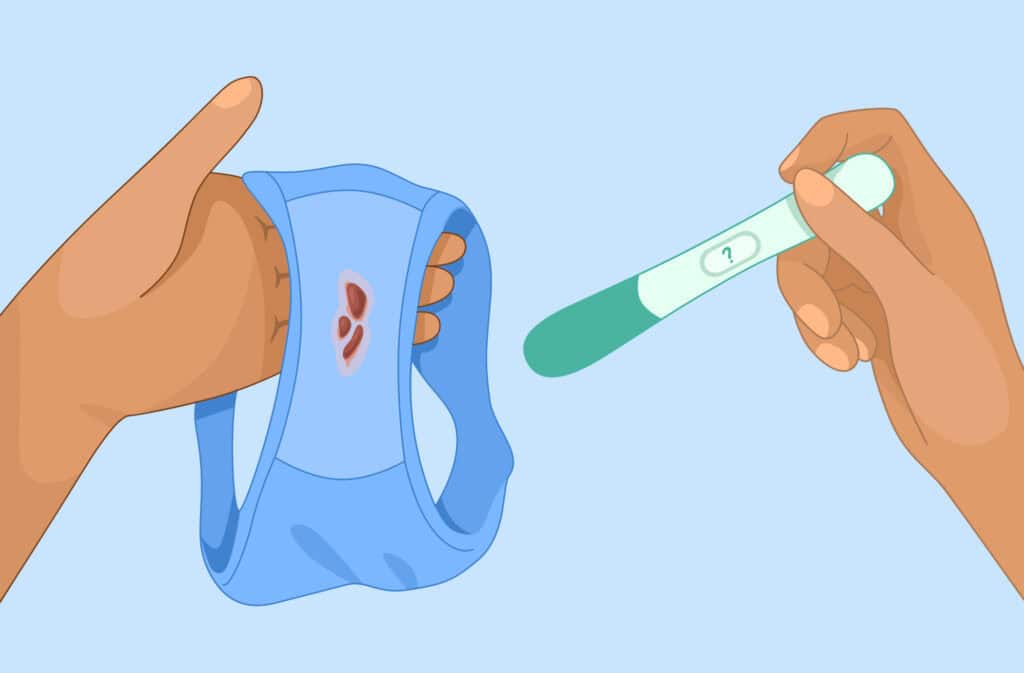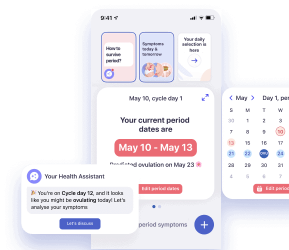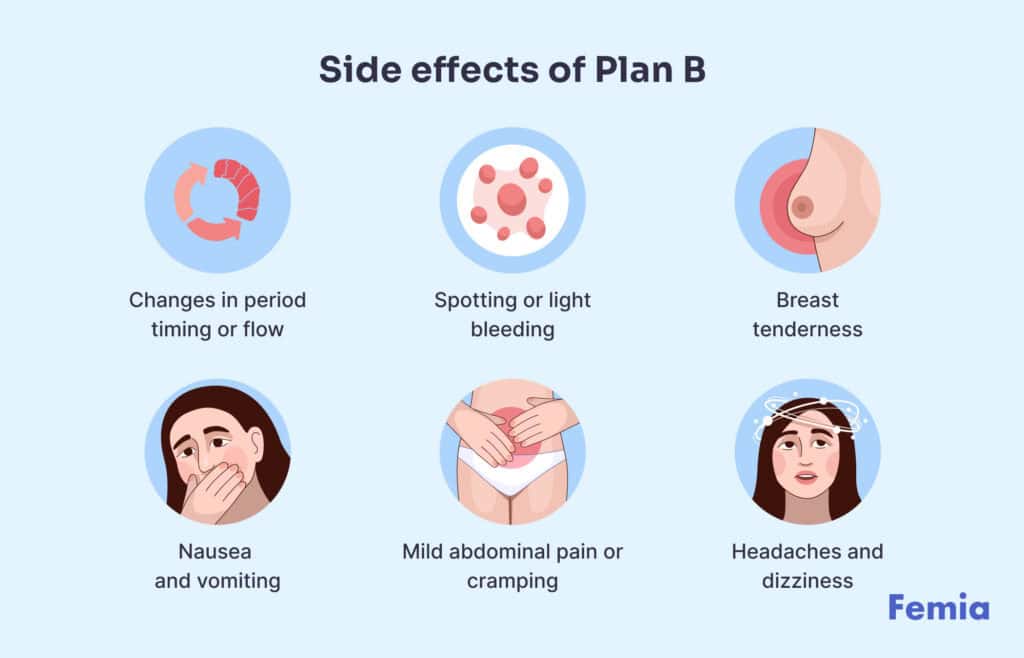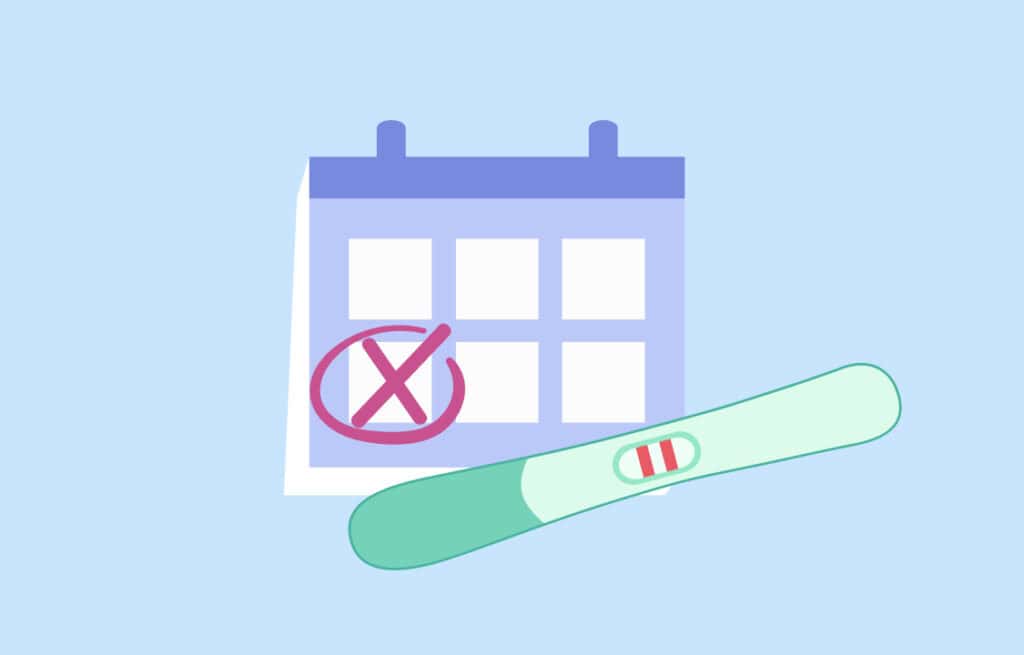Femia > Health Library > Your cycle > Health > Plan B spotting vs implantation bleeding: How to tell the difference
Plan B spotting vs implantation bleeding: How to tell the difference

- Updated Feb 25, 2025
- Published
CRAFTED BY HUMAN
Crafted by human At Femia, we provide accurate and up-to-date information at every stage of your journey, from trying to conceive, pregnancy and postnatal support. All content is created by a real person based on in-depth research and own professional experience. Femia ensures that you will receive expert advice, strict accuracy and a personalized approach from our authors/medical experts. Learn more about our editorial policy.
FACT CHECKED
Fact checked At Femia Health, we maintain the highest standards of editorial excellence in delivering content focused on helping you conceive, guiding you through pregnancy, and supporting you postpartum. Explore our content review principles to learn how we ensure the accuracy and quality of our health and lifestyle tips for every stage of your journey.
Bleeding after taking Plan B is common and not usually a cause for concern. It doesn’t mean it’s failed. However, implantation can also cause spotting, and it’s important to differentiate between the two.
Plan B bleeding typically occurs within a few days of taking the pill, lasts 2–3 days, and is light to moderate in flow. Implantation bleeding typically occurs 10–14 days after ovulation, lasts a few hours up to two days, and is light bleeding or spotting.
If you’ve taken Plan B and are now experiencing some unusual vaginal bleeding, you’re probably wondering what’s going on. Spotting or light bleeding after taking Plan B is common and doesn’t mean it’s failed. But, it can still be confusing, and you might be asking yourself if this light bleeding is due to Plan B, implantation, or the menstrual phase of your cycle?
We’ve created this Plan B spotting vs implantation bleeding guide to help you understand what’s going on. By looking at when your spotting started and how long it lasted, we can help you narrow down the most likely cause.

What is Plan B and how does it work?
Plan B is an emergency contraceptive pill, often called the “morning-after pill.” It helps prevent pregnancy after unprotected sex or birth control failure. It contains a dose of levonorgestrel, a synthetic form of progestin, and prevents pregnancy by:
- Interrupting your menstrual cycle and delaying ovulation—the release of an egg by an ovary—by a few days.
- Delayed ovulation means sperm die before they can fertilize the egg.
- It can also prevent sperm from fertilizing an egg or a fertilized egg attaching to the womb (implantation).
- If a fertilized egg is already implanted, it won’t end the pregnancy.
👉Find out more: Signs Plan B didn’t work: What to watch for and what to do next
The morning-after pill is not the same as regular birth control and is not for regular use. It’s designed to reduce your chances of getting pregnant if you’ve had sex and not used birth control or if your regular birth control has failed. Birth control can fail for many reasons including:
- Condom breaking
- Missing pills
- Not taking the mini-pill at the same time each day
- Not getting the next injection at the right time
- IUD has come out
- The diaphragm or cervical cap has dislodged or broken
| Important to know |
|---|
| Morning-after pills containing levonorgestrel, like Plan B, can be taken up to 72 hours after unprotected sex. But, the earlier it is taken, the more effective it is at preventing pregnancy. According to Planned Parenthood, taking a levonorgestrel morning-after pill reduces your chances of getting pregnant by 75–89%. |
Side effects of Plan B

Plan B interrupts your normal menstrual cycle and delays the release of an egg during that cycle. Common side effects include:
- Makes your period earlier or later, heavier or lighter than normal
- Spotting or light vaginal bleeding
- Breast tenderness
- Nausea and vomiting
- Mild abdominal pain or cramping
- Headaches and dizziness
While severe side effects from Plan B are rare, reach out to your healthcare provider if you have any concerns about your symptoms.
What is implantation bleeding?
Implantation bleeding is light bleeding or spotting that can occur when a fertilized egg attaches itself to the lining of the uterus in a process called ”implantation.” Not every woman will experience implantation bleeding, but for some women, it can be one of the earliest signs of pregnancy, happening even before a pregnancy test is positive.
According to the American Pregnancy Association (APA), implantation bleeding typically occurs around 6-10 days after conception and affects about one-third of pregnant women.

Plan B spotting vs implantation bleeding: Key differences
| Plan B spotting | Implantation bleeding | |
|---|---|---|
| Timing | • Occurs within a few days of taking Plan B
In a 2006 study of 232 women, published in the journal Contraception, 14.7% of women experienced bleeding on average four days after taking the morning-after pill. | • Occurs 10–14 days after ovulation
Implantation can occur around the time you expect your period and can be mistaken for a light period. |
| Color and appearance | • Brown, red or light pink discharge
• Lighter than a period but can be heavier than spotting | • Dark pink or brown discharge
• Light flow or spotting |
| Duration | • Breast tenderness
• Nausea/vomiting • Tiredness • Headaches • Mild abdominal cramps | • Breast tenderness
• Nausea • Tiredness • Headaches • Implantation cramps |
How to know what type of bleeding you’re experiencing
If you’re noticing unusual bleeding after taking the morning after pill, and you’re not sure why, answer these questions to help determine the cause:
- Did you take plan B in the last few days?
Yes: Plan B spotting usually happens within a few days of taking the morning-after pill.
No: Implantation bleeding happens 10–14 days after ovulation, close to when you might expect your next period.
- How heavy is the bleeding?
This can vary from woman to woman but, in general, implantation bleeding is very light bleeding or spotting, whereas plan B spotting can range from very light to moderate. It should still be lighter than a period.
- How long did the bleeding last?
A few hours to two days: Implantation bleeding usually only lasts a few hours up to two days; for many women it is barely noticeable.
2–3 days (or longer): Plan B bleeding lasts 2–3 days on average, but for some women, it can last up to a week.
- Have you taken a pregnancy test?
It’s impossible to say for certain whether light bleeding after taking Plan B is caused by the morning-after pill or implantation. If your period is more than a week late, consider taking a pregnancy test.
👉Find out more: Can you get pregnant on your period? Understanding the odds and timing
When to consult a healthcare provider
Most women don’t need to contact their healthcare provider after taking Plan B, but you should seek medical advice if you experience any of the following:
- Heavy bleeding
- Abdominal pain
- Watery brown discharge
- Pain in your shoulder
- Diarrhea or discomfort when going to the toilet
These can be signs of miscarriage or ectopic pregnancy and need to be seen by a healthcare provider urgently.
If you find that you have ongoing irregular periods or bleeding between periods after taking Plan B, reach out to your healthcare provider. could be a sign of an underlying hormonal imbalance and may need investigating.
Questions from the Femia community
Can Plan B change the timing of my next period?
Yes; it may cause your next period to be earlier or later. It can also make it heavier or lighter than usual or cause you to have some bleeding in the middle of your cycle.
Does spotting mean Plan B worked?
Not necessarily. While spotting can be a common side effect of taking the morning-after pill, it is not a guarantee. There are also other reasons you might have spotting during your cycle that aren’t related to taking Plan B, including implantation or an infection.
What does it mean if I have cramping and spotting after Plan B?
These are common side effects and usually not a concern, but if you feel that your symptoms are severe, or you have any concerns, then reach out to your healthcare provider. It’s always better to get checked out if you feel something might be wrong.
Can Plan B cause implantation bleeding?
No; Plan B prevents ovulation and fertilization, so implantation bleeding shouldn’t occur after taking it. However, if implantation has already happened before taking Plan B, then it won’t stop the pregnancy.
Is brown discharge after Plan B normal?
Yes; it’s a common side effect caused by taking the morning-after pill. The levonorgestrel morning-after pill is a synthetic hormone that interrupts your menstrual cycle and delays ovulation. It commonly causes changes to your menstrual cycle, including light spotting before your period.
What if I have spotting after taking Plan B and still miss my period?
Spotting is not the same as having a period, and having spotting doesn’t mean you can’t be pregnant. If your period is more than a week late, then you need to take a pregnancy test. If the pregnancy test is negative but your period still doesn’t arrive for another week, then take a second test and contact your healthcare provider.
The bottom line
Spotting or light vaginal bleeding is a common side effect of taking Plan B, and it doesn’t mean the pill didn’t work. However, other factors, like implantation, can also cause spotting. Understanding the most likely cause can help you to plan your next steps.
Bleeding after Plan B tends to be light to moderate, starts within a few days of taking the pill, and lasts 2–3 days. It can be associated with other symptoms, like nausea, breast tenderness, and headaches. Implantation bleeding typically starts 10–14 days after ovulation, is very light, and can last from a few hours to two days. It typically occurs just before you expect your period to arrive and can be associated with other signs of early pregnancy, like nausea, breast tenderness, and tiredness.
If your period is more than a week late, it’s a good idea to take a pregnancy test. If you’re experiencing unusually heavy or prolonged bleeding, tummy pain, or you’re generally concerned about your symptoms, reach out to your healthcare provider for personalized advice.
References
- “What Is Implantation Bleeding?” American Pregnancy Association, 20 Sept. 2023, americanpregnancy.org/pregnancy-symptoms/what-is-implantation-bleeding.
- Gainer, Erin, et al. “Menstrual Bleeding Patterns Following Levonorgestrel Emergency Contraception.” Contraception, vol. 74, no. 2, May 2006, pp. 118–24. https://doi.org/10.1016/j.contraception.2006.02.009.
- “Implantation Bleeding: Common in Early Pregnancy?” Mayo Clinic, www.mayoclinic.org/healthy-lifestyle/pregnancy-week-by-week/expert-answers/implantation-bleeding/faq-20058257.
- “Plan B Morning-After Pill | How Plan B Works and Side Effects.” Planned Parenthood, www.plannedparenthood.org/learn/morning-after-pill-emergency-contraception/whats-plan-b-morning-after-pill.
- Professional, Cleveland Clinic Medical. “Implantation Bleeding.” Cleveland Clinic, 9 Aug. 2024, my.clevelandclinic.org/health/symptoms/24536-implantation-bleeding.
- “Morning-After Pill.” Cleveland Clinic, 3 Jan. 2025, my.clevelandclinic.org/health/treatments/23386-morning-after-pill.
- Vrettakos, Christina, and Tushar Bajaj. “Levonorgestrel.” StatPearls – NCBI Bookshelf, 22 May 2023, www.ncbi.nlm.nih.gov/books/NBK539737.
Website, Nhs. “Symptoms.” nhs.uk, 4 Dec. 2023, www.nhs.uk/conditions/ectopic-pregnancy/symptoms.

Discover things to avoid after losing mucus plug and what to do next. Learn how long after losing mucus plug labor starts and what happens to your body. Expert advice from Femia.

Wondering if sushi is safe during pregnancy? Learn why raw fish should be avoided and discover pregnancy-safe sushi options, including cooked and vegetarian rolls.

Learn about the process of implantation, discover the early signs, such as implantation bleeding and cramping, and how the hormone hCG becomes detectable soon after.

